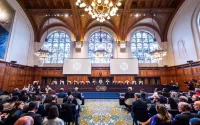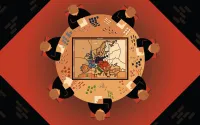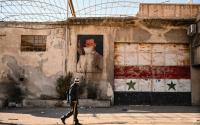Tuesday April 9, 2002The GuardianTwo sets of human shields are in use in the West Bank. The first is less than willing. The Israeli army, like some of the terrorist groups it has fought, has been taking hostages. Its soldiers have been propelling Palestinian civilians through the doors of suspect buildings, so that the gunmen they might harbour have to kill them first if they want to fight back. The second set of human shields has deliberately placed itself in the line of fire. Since the army's offensive in the West Bank began, hundreds of Israeli peace campaigners and foreign activists have been seeking to put themselves in its way. At great personal risk, members of the International Solidarity Movement have sought to protect civilians by making hostages of themselves. It is a display of extraordinary courage and self-sacrifice. It is also the latest incarnation of a movement which just months ago was left for dead. The movement to which many of the peace activists risking their lives in Ramallah and Bethlehem belong has no name. Some people have called it an anti-globalisation or anti-corporate or anti-capitalist campaign. Others prefer to emphasise its positive agenda, calling it a democracy or internationalist movement. But, because they have always put practice first and theory second, its members have proved impossible to categorise. Whenever it appears to have assumed an identity outsiders believe they can grasp, it morphs into something else. It is driven by a new, responsive politics, informed not by ideology but by need. After September 11, this nameless thing appeared to vanish as swiftly as it had emerged. The huge demonstrations planned for the end of September against the World Bank and IMF in Washington became a small and rather timorous march for peace. Most US activists, cowed by the new McCarthyism which has dominated American discourse since the attack on New York, kept their heads down. Commentators dismissed the movement as a passing fad which had rippled through the world's youth, as widespread and as insubstantial as Diet Coke or the Nike swoosh. But those who dismissed it had failed to grasp either the seriousness of its intent or the breadth of its support. The television cameras always focused on a few hundred young men dressed in black and running riot, intercut occasionally with the wider carnival of protest. But they seldom permitted its participants to explain the sense of purpose which propelled them. So most outsiders failed to see that the commitment of many of the people involved in these protests is non-negotiable. The movement is no more likely to go away than the governments and corporations it confronts. Its survival is assured by its ability to become whatever it needs to be. Last month 250,000 protesters trav elled to Barcelona to contest the assault on employment laws and the public sector being led by Tony Blair, Silvio Berlusconi and Jose Maria Aznar. This month some of them moved to Palestine. Among those in the British contingent are people who have helped to run campaigns against corporate power, genetic engineering and climate change. They were joined this week by members of the Italian organisation Ya Basta, which helped to coordinate the protests in Genoa. For the movement which came of age in Seattle, the World Bank and the West Bank belong to the same political territory. If the protesters simply shifted as a mob from one location to another, their efforts would be worse than useless. But one of the key lessons this rapidly maturing movement has learned is that protest is effective only if it builds on the efforts of specialists. Like most of the Earth's people, the foreigners on the West Bank became visible when they began to bleed (five British campaigners were injured last week by the Israeli army's illegal fragmentation bullets), but some outsiders have been working there for decades. New arrivals join long-established networks and do what they are told. Among the bullets and the bulldozers, the movement is discovering a courage long suspected but seldom tried. Protesters have moved into the homes of people threatened with bombardment by the Israeli army, ensuring that the soldiers cannot attack Palestinians without attacking foreigners too. They have been sitting in the ambulances taking sick or injured people to hospital, in the hope of speeding their passage through Israeli checkpoints and preventing the soldiers from beating up the occupants. They have been trying to run convoys of food and medicine into neighbourhoods deprived of supplies; and seeking to encourage both sides to lay down their arms in favour of non-violent solutions. They are becoming, in other words, a sort of grassroots United Nations, trying with their puny resources to keep the promises their governments have broken. Perhaps most importantly, the peace campaigners are the only foreign witnesses in some places to the atrocities being committed. Using alternative news networks such as Indymedia and Allsorts, they have been able to draw attention to events most journalists have missed. They have seen how Palestinians, told by the Israeli army that the curfew had been lifted, have been either shot dead when they stepped outside or seized and used as human shields. They have witnessed the sacking of homes and the deliberate destruction of people's food supplies. They have seen ambulances and aid trucks being stopped and crushed. On March 28 one peace protester watched Israeli soldiers in jeeps hunting women and children who were fleeing across the fields on the outskirts of Ramallah, trying to shoot them down in cold blood. And, by becoming the story themselves, as they are beaten and shot, the foreigners have brought it home to people who were dismissive of the murder and maiming of indigenous civilians. The movement's arrival on the West Bank is an organic development of its activities elsewhere. For years it has been contesting the destructive foreign policies of the world's most powerful governments, and the corresponding failures of the multilateral institutions to contain them. Rather than echo the thunderous but effete demand of commentators on both sides of the Atlantic that Yasser Arafat (a man currently unable to use a flushing toilet) should stamp out the terror in the Middle East, the campaigners are, as ever, addressing those who wield real power: Israel and the governments who supply the money and weaponry which permit it to occupy the West Bank. The movement has always been a pragmatic one, as ready to protest against Burma's treatment of its tribal people or China's dispossession of the Tibetans as the IMF's handling of Argentina. In Palestine, as elsewhere, it is seeking to place itself between power and those whom power afflicts. Everyone else is demanding that somebody should do something about the conflict in the Middle East. The peace campaigners are doing it. · www.monbiot.com Guardian Unlimited © Guardian Newspapers Limited 2002
Canlı Yayın
Kâinatın tüm seslerine, renklerine, titreşimlerine Açık Radyo...
Ekolojiden siyasete, edebiyattan müziğe Apaçık Radyo'da haftanın öne çıkan gündemleri mail kutunuzda!
İletişim
Açık Medya Yayıncılık A.Ş.
Koltukçular Çıkmazı No 7 İç Kapı No 2
Tophane, Beyoğlu, İstanbul, TR-34425
Telefon: +90 212 343 4040
Faks: +90 212 232 3219
E-posta: [email protected]






